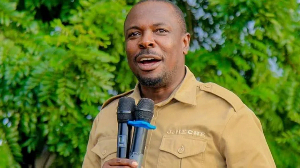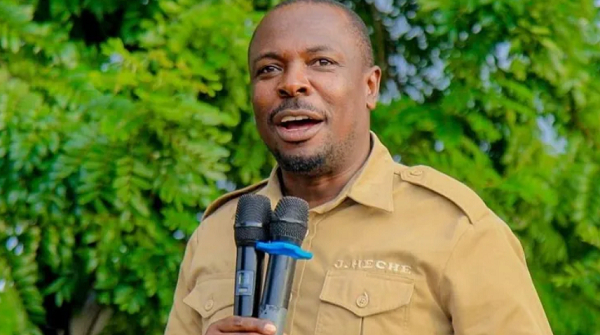 John Heche was detained a week before the elections
John Heche was detained a week before the elections
The deputy leader of Tanzania’s main opposition party, Chadema, is facing terrorism charges, two weeks after his arrest in the capital Dodoma, his lawyer has said.
John Heche is now being held in the main city Dar es Salaam, where he was informed of the charges, his lawyer Hekima Mwasipu told BBC Swahili. It is unclear when he will appear in court.
The government did not respond to the BBC’s request for comment.
He was arrested ahead of last week’s elections, denounced by the opposition as a “sham”. President Samia Suluhu Hassan was sworn in on Monday after being declared the winner with 98% of the vote.
Chadema’s chairman, Tundu Lissu, remains in detention on treason charges, which he denies.
The elections were marred by widespread protests and deadly violence, with observers saying they fell short of democratic standards.
On Wednesday, African Union observers described the election as “compromised,” saying they witnessed ballot stuffing and multiple ballots being issued to voters.
“The 2025 Tanzania General Elections did not comply with AU principles, normative frameworks, and other international obligations and standards for democratic elections,” the initial report from the AU mission said, in a rare rebuke over the conduct of an election.
The mission said Tanzania should “prioritise electoral and political reforms to address the root causes of its democratic and electoral challenges”.
Earlier, observers from the regional Southern African community (Sadc) which includes Tanzania, said it did not meet the requirements of a free and fair elections.
The Tanzanian government has insisted that the election was fair and transparent.
In the aftermath, families have been searching for, or burying, relatives killed in the clashes between the security forces and opposition supporters during the elections.
Chadema previously told the AFP news agency that there were “no less than 800” deaths by Saturday, while a diplomatic source in Tanzania told the BBC there was credible evidence that at least 500 people had died.
The government has sought to downplay the scale of the violence and has dismissed the number of deaths given by the opposition as greatly exaggerated.
During her inauguration ceremony, President Samia acknowledged the “loss of lives and destruction of public property”, but added that it was “not surprising” that some of those arrested were foreign nationals.
Ahead of the election, rights groups had condemned government repression, with Amnesty International citing a “wave of terror” involving enforced disappearances, torture, and extrajudicial killings of opposition figures. The government rejected the claims.
Because of his detention, Lissu was unable to contest the presidential election and his party boycotted the vote. Another key opposition figure, Luhaga Mpina of ACT-Wazalendo, was disqualified on legal technicalities.
Heche was arrested on 22 October, a week before the election.
On Wednesday, his lawyer told the BBC that he had visited Heche at the police station in Dar es Salaam and said he was not in good health. He added that they had filed a petition seeking his release on bail.
